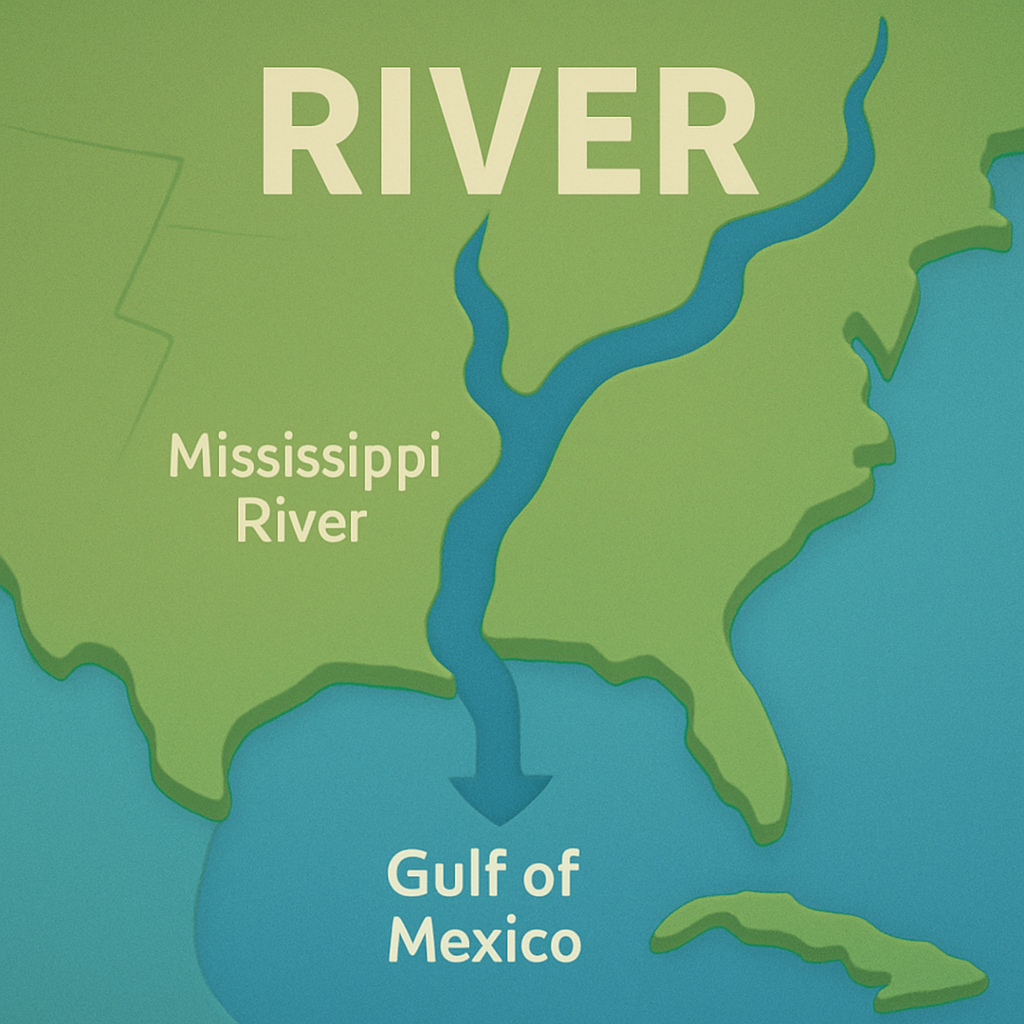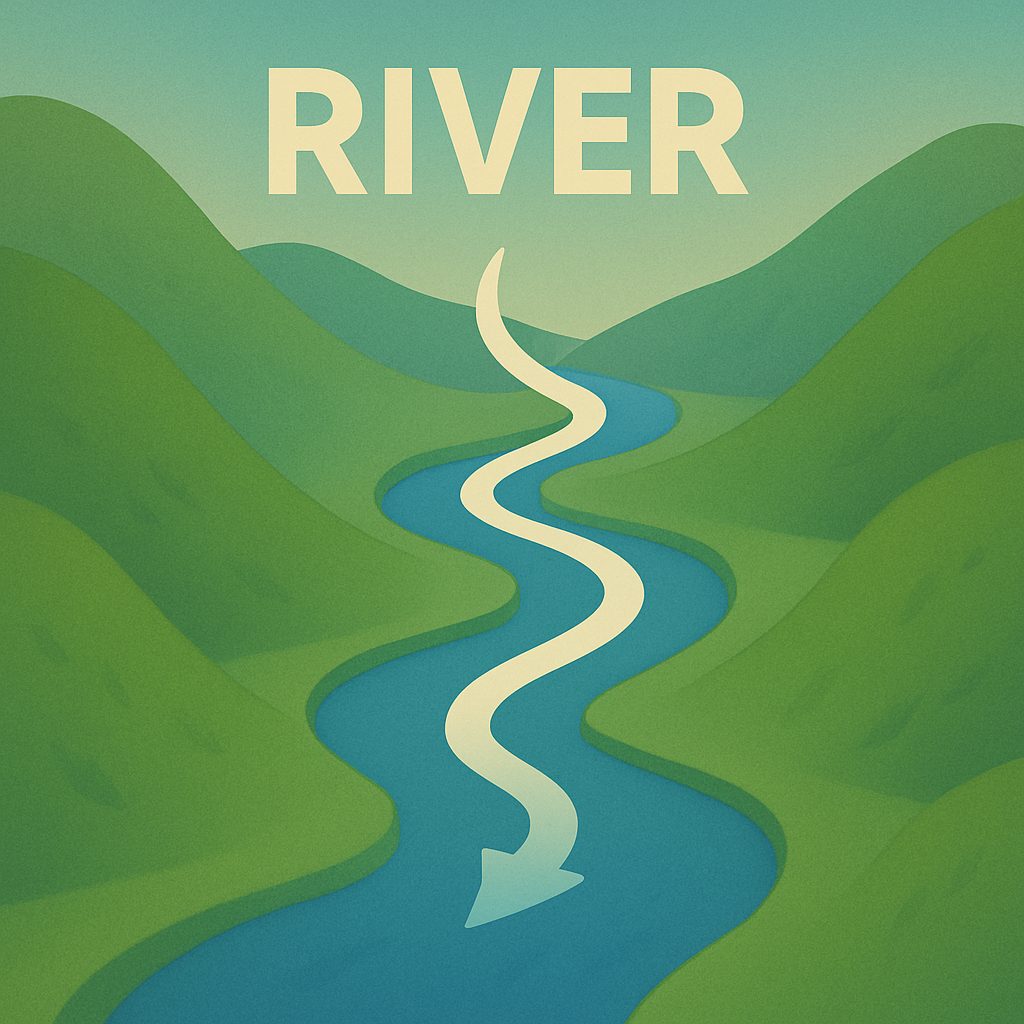River
Definition
The term "river" describes a large, natural stream of water flowing in a channel to the sea, a lake, or another river.
Parts of Speech
- Noun
Pronunciation
American English
- IPA Pronunciation: /ˈrɪv.ɚ/
- Respelling: RIV-er
British English
- IPA Pronunciation: /ˈrɪv.ə/
- Respelling: RIV-uh
Etymology
The word "river" originates from Old French "riviere," meaning "riverbank" or "stream," derived from Latin "ripa," meaning "bank" or "shore." It entered the English language in the late Middle Ages.
Derivatives
- Riverine (adjective)
- Riverman (noun)
- Rivermouth (noun)
- Rivertown (noun)
- Riverside (noun/adjective)
Synonyms
- Stream
- Waterway
- Brook
Antonyms
- Desert
- Dry land
- None
Usage
The term "river" is used to describe natural watercourses in various geographic and ecological contexts. For example: "The Amazon River is one of the longest rivers in the world," or "They built their house near a river for easy access to water."
Related Terms
- Stream: A smaller flow of water.
- Tributary: A river or stream flowing into a larger river or lake.
- Estuary: The tidal mouth of a large river.
Detailed Definitions
Noun
- A large natural stream of water flowing in a channel: Refers to significant water bodies with continuous flow.
- Example: "The Mississippi River flows into the Gulf of Mexico."
- A channel that carries water from its source to its mouth: Refers to the geographical and hydrological aspect.
- Example: "The river winds through the valley."
- A metaphorical or symbolic flow of something: Refers to abundant or continuous flow, such as emotions or actions.
- Example: "A river of people poured into the streets during the festival."
river



🇨🇳 Mandarin
- 河 (River): Hé
- IPA: /xɤ˧˥/
- Respell: Her
🇮🇳 Hindi
- नदी (River): Nadī
- IPA: /nədiː/
- Respell: Na-dee
🇪🇸 Spanish
- Río (River): Río
- IPA: /ˈri.o/
- Respell: Ree-oh
🇫🇷 French
- Rivière (River): Rivière
- IPA: /ʁi.vjɛʁ/
- Respell: Ree-vyer
🇸🇦 Modern Standard Arabic
- النهر (River): An-nahr
- IPA: /an.naːhʕr/
- Respell: An-na-hr
🇧🇩 Bengali
- নদী (River): Nodī
- IPA: /nɔdi/
- Respell: No-dee
🇷🇺 Russian
- Река (River): Reka
- IPA: /ˈrʲekə/
- Respell: Ryeka
🇵🇹 Portuguese
- Rio (River): Rio
- IPA: /ˈʁiu/
- Respell: Ree-u
🇮🇩 Indonesian
- Sungai (River): Sungai
- IPA: /sʊŋai/
- Respell: Soong-ai
🇩🇪 German
- Fluss (River): Fluss
- IPA: /flʊs/
- Respell: Flus
🇯🇵 Japanese
- 川 (River): Kawa
- IPA: /kaɰa/
- Respell: Ka-wa
🇻🇳 Vietnamese
- Sông (River): Sông
- IPA: /sɔːŋ˧/
- Respell: Song
🇰🇷 Korean
- 강 (River): Gang
- IPA: /ka̠ŋ/
- Respell: Kang
🇹🇷 Turkish
- Nehir (River): Nehir
- IPA: /ne.hiɾ/
- Respell: Ne-hir
🇵🇰 Urdu
- دریا (River): Daryā
- IPA: /d̪ərjaː/
- Respell: Dar-ya





